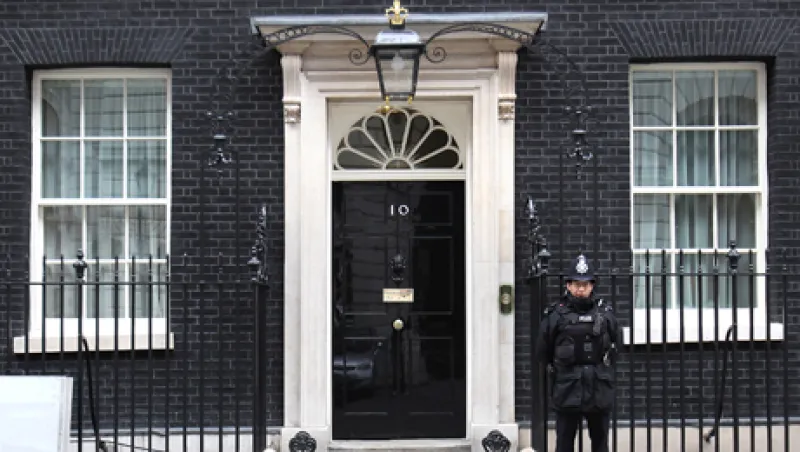Britain has spent two decades as the grumbling guest at the European Union party since the body came into being in 1993 — complaining about the conversation, angry at its contribution to the expenses and dissatisfied at the notion that it must join all the group activities. However, it now appears to have found a solution: It is not leaving the party altogether, but going into the lonely hallway.
Responding to exploratory moves by some EU officials towards a separate transnational budget for the euro zone, David Cameron, Britain’s Conservative prime minister, broke with historical British policy earlier this month by expressing tentative support for the idea. Cameron suggested: “There will come a time, I believe, when you will need to have two European budgets: one for the single currency — because they are going to have to support each other much more — and perhaps a wider budget for everybody else.”
This marks a departure from previous British realpolitik. British leaders had historically always wanted a seat at the center of European discussions, whenever any major decision was being made about Europe. This was partly to ensure that there were no moves that ran directly to the country’s national interest. It was also because it had a horror of missing out — of becoming ever more isolated from the rest of Europe —as other members of the EU agreed on measures that would increase their political and economic links with each other at the expense of links with Britain. Most crucially, Britain was afraid of finding itself cut off from trade: The EU accounts for 50 percent of its goods exports.
If the euro zone had its own budget, the euro zone’s 17 members would become even more interconnected. Euro zone ministers would end up meeting and talking with each other far more frequently than with ministers from outside the euro zone — accentuating an existing trend. Of particular importance is the fact that Germany and France, which along with Britain, have historically formed the unofficial triumvirate of the EU great powers, would be tied together ever more tightly. Britain is already the least influential of this threesome because of its relative detachment. A separate euro zone budget would probably, in due course, replace the trio altogether with a Franco-German duo.
Why has Cameron taken this step towards relinquishing his country’s role as one of the EU’s great powers? One reason is his reflexive aversion to anything to do with the EU, born of the knowledge that Conservative splits over Europe prompted Margaret Thatcher’s forced departure as premier in 1990 and contributed to the Conservative Party’s years out of office from 1997 to 2010. He and George Osborne, his finance minister and closest ally, are also horrified at the idea of having to pay any more than absolutely necessary of the clean-up costs of the euro zone debt crisis. The best way of minimizing one’s obligations is to stay away from the decisions made in Brussels.
Britain’s increasingly semidetached status — which is unlikely to end in outright departure from the EU — also appears, at first sight at least, to suit both Germany and France. They have found it difficult to secure agreement on EU-wide measures both to mitigate the euro zone debt crisis and to prevent it from happening again. The biggest obstacle to winning agreement for the March 2012 EU fiscal compact — an agreement enforcing balanced budgets on member states — was British opposition. A deal was, in the end, achieved that excluded Britain, but in the frenetic and unpredictable atmosphere of all-night discussion, the deal could very easily have been scuppered by British resistance.
What does semidetachment mean for the U.K. — an isolationist British policy of allowing other member states to do what they like, and vice-versa, as long as their decisions do not affect Britain? It would allow the country to pursue its highly free-market version of capitalism, which includes a relatively unfettered market in international finance. The rest of Europe could meanwhile go down a more interventionist path, characterized by an inherently suspicious attitude towards this sector.
An example of how this situation can work for both sides is the European Commission’s proposed Tobin tax on capital markets transactions. France and Germany are keen to implement it, both to raise revenue and to discourage the financial speculation, which they think contributed to the credit crunch. Britain would benefit if the tax was imposed on the European mainland because it would shift more transactions to the City of London, increasing its dominance of the European capital market industry still further.
How would the rest of the EU look if Britain became progressively more distant from EU deliberations? It would look more German. The political power of Europe’s largest economy is growing every greater within the EU because it is the only large country with a satisfactory fiscal position. As a result, no pan-EU policy involving the deployment of massive financial firepower can go ahead without German permission. Without the British counterweight, Germany would be even more dominant.
The most important German priority is fiscal rectitude — hence the fiscal compact, championed by German Chancellor Angela Merkel, and her proposal at last week’s EU summit to give the EU economics commissioner a veto over national budgets that violate EU rules, including the new compact.
Herein lies a potential problem for other EU states that do not believe in Germany’s ultra-strict fiscal approach. Chief among these is France, whose president since May, François Hollande, has led the call for a leavening of fiscal austerity across the euro zone through pan-European funds aimed at boosting economic growth. He has also delayed the timetable for a balanced budget in his own country by one year to 2017 — and has used what some analysts regard as excessively rosy assumptions about economic growth even to meet this target, in order to relieve the pressure for fiscal tightening.
Britain is certainly no fan of excessive fiscal flexibility — Cameron and Osborne have been attacked by domestic critics for not being adaptable enough on this issue. However, it has in the past consistently taken a stand against pan-European control over individual countries’ affairs, putting it at odds against centralizing tendencies that have come sometimes from France, and sometimes from Germany. This brake on centralization is now, because of Britain’s detachment, less strong than before.
France may wince at the grumpy guest at the EU house party from across the English Channel. However, Britain has sometimes played a useful role in forestalling the imposition of grand designs on Europe by would-be dominant powers on the mainland — not only since the EU’s birth but also for four centuries before that. France may be even more disgruntled if Germany takes charge of the party and takes away the finger food that keeps it from starvation.






